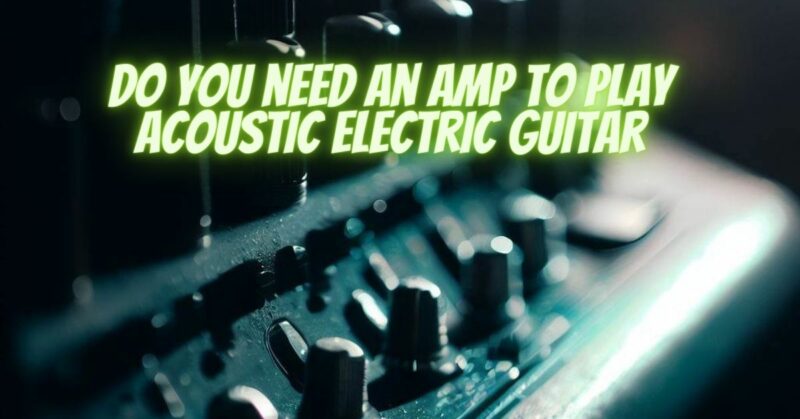Acoustic-electric guitars have become increasingly popular among musicians due to their versatility and ability to be played both acoustically and amplified. One common question that arises is whether you need an amplifier to play an acoustic-electric guitar. In this article, we will explore the features and capabilities of acoustic-electric guitars and discuss when and why you might use an amplifier with these instruments.
Acoustic-Electric Guitars: The Best of Both Worlds
An acoustic-electric guitar is a hybrid instrument that combines the qualities of both acoustic and electric guitars. Like a traditional acoustic guitar, it can be played acoustically without any external amplification. The sound is produced solely by the guitar’s body and strings, and the tone is projected acoustically, making it suitable for intimate performances, practice sessions, or situations where amplification is not required.
Using an Amplifier with an Acoustic-Electric Guitar
The defining feature of an acoustic-electric guitar is the onboard pickup system it includes. This pickup system allows the guitar to be connected to an external amplifier or sound system, enabling it to be amplified for larger audiences or venues where acoustic projection may not be sufficient.
When to Use an Amplifier:
- Live Performances: Amplifying your acoustic-electric guitar during live performances allows you to reach a broader audience and ensures that your music is heard clearly, even in larger venues or noisy environments.
- Band Settings: When playing with other musicians, especially in a band setting, using an amplifier helps to balance the sound and ensures your guitar’s presence in the mix.
- Recording: When recording your acoustic-electric guitar, using an amplifier can capture a more direct and controlled sound, allowing for better signal processing and mixing options during post-production.
- Sound Shaping: An amplifier provides the opportunity to shape your guitar’s tone and add various effects such as reverb, chorus, or delay, enhancing your overall sound and musical expression.
When Not to Use an Amplifier:
- Intimate Settings: In small, intimate settings, such as a small gathering or acoustic jam session, amplification may not be necessary, and playing the guitar acoustically will suffice.
- Solo Practice: During solo practice sessions at home or in a quiet environment, you can play your acoustic-electric guitar without an amplifier for a more immediate and natural playing experience.
In conclusion, while you do not require an amplifier to play an acoustic-electric guitar, having the option to amplify your sound can greatly enhance your musical opportunities. Acoustic-electric guitars offer the flexibility to be played acoustically or connected to an amplifier for larger performances, recording sessions, or when seeking to shape your sound with various effects.
The choice to use an amplifier with your acoustic-electric guitar will depend on your specific musical needs and the context in which you are playing. Having the option to amplify your guitar expands your sonic possibilities and ensures that your music can be enjoyed by a broader audience while retaining the natural and rich tones that acoustic-electric guitars are known for.


